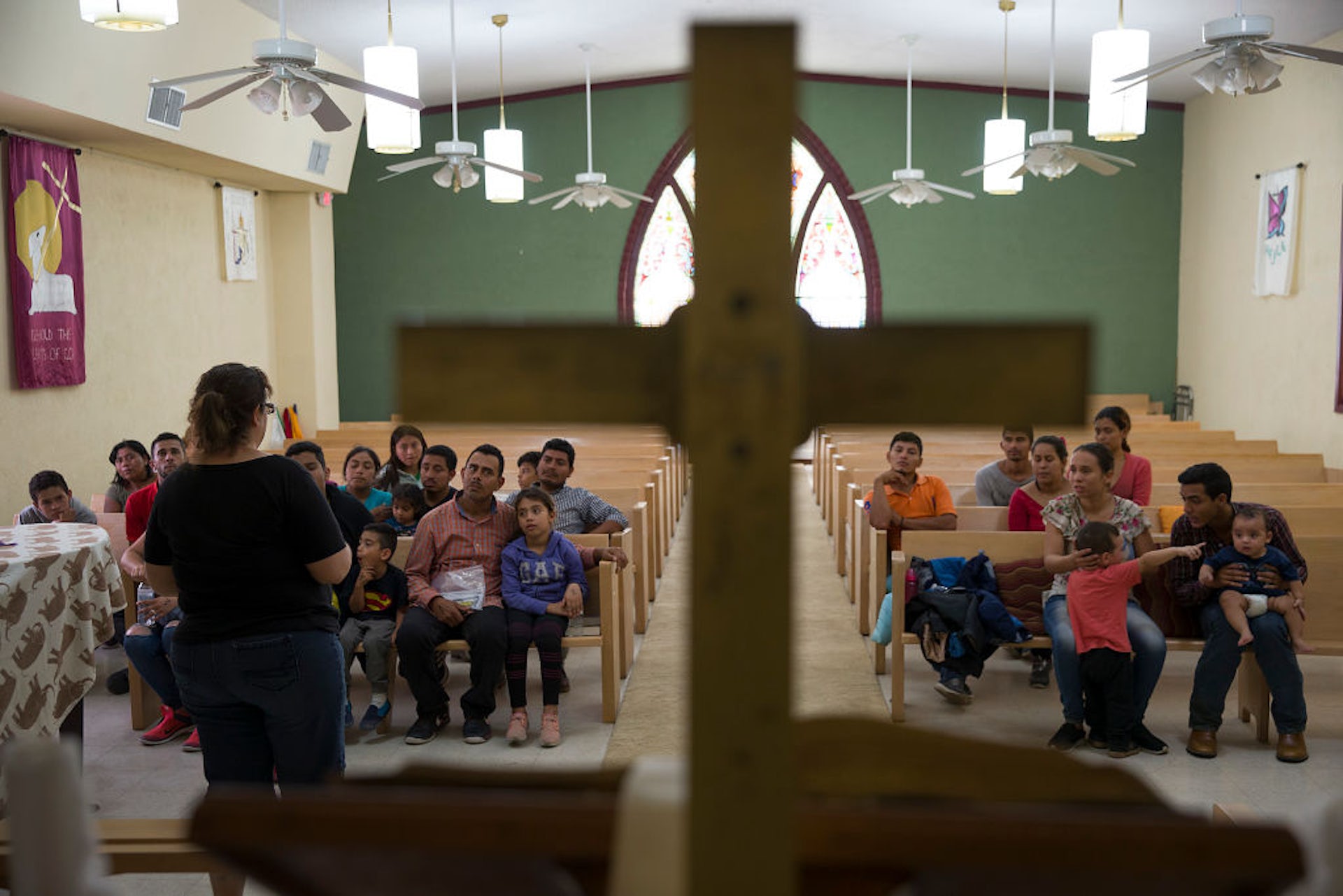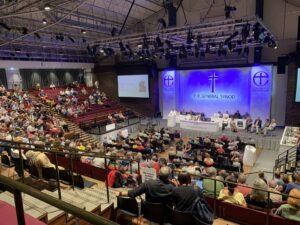Many spiritual traditions preach the necessity to take care of strangers. However what occurs when caring for the stranger comes into battle with authorities coverage?
After Title 42 restrictions on the U.S. border ended on Might 11, 2023, debates about immigration have heated up once more – targeted totally on reform, border safety or refugees’ wants.
However the therapy of immigrants is deeply intertwined with spiritual freedom as nicely. As a scholar of non secular ethics who research immigration, I’m occupied with latest instances that spotlight rising tensions between immigration insurance policies and non secular teams’ commitments to pastoral and humanitarian care.
Ministry on the border
One high-profile instance facilities on Rev. Kaji Douša, senior pastor at Park Avenue Christian Church in New York Metropolis, who traveled to Tijuana, Mexico, in 2018 to supply pastoral care to asylum seekers.
Her work was flagged by Customs and Border Safety after a Honduran girl allegedly stated that Douša advised migrants that marrying one another would make it simpler to obtain authorized papers within the U.S. As Douša later testified, she did carry out spiritual ceremonies, however just for {couples} who have been already in common-law marriages and with out claiming to supply any authorized standing.
Douša’s title and picture have been added to a Division of Homeland Safety watch checklist that included attorneys, journalists and activists, and she or he was detained and questioned by CBP officers upon her return to the U.S. A CBP official additionally despatched an e mail to Mexican authorities asking them to ban Douša from getting into Mexico as a result of she lacked correct documentation – which the official later acknowledged had no foundation in truth.
Douša filed a lawsuit accusing DHS of unjust surveillance and retaliation, and in March 2023 a federal decide dominated in her favor. Choose Todd Robinson agreed that DHS had violated Douša’s proper to freedom of non secular expression by instructing Mexican authorities to detain her.
Each Douša and the United Church of Christ, which ordained her, argued that her actions have been primarily based in her spiritual commitments. Douša beforehand said, “To reject a migrant is to solid away God’s angels, which I’m unwilling to do.”
Shifts within the authorized panorama
This isn’t the primary time spiritual leaders or teams offering pastoral and humanitarian care to migrants have come beneath scrutiny.
One well-known instance is the Sanctuary Motion of the Nineteen Eighties, a casual community of as much as 500 church buildings whose members supplied protected haven to undocumented asylum seekers fleeing violence in Central America.
A number of members of the motion have been convicted of conspiring to smuggle immigrants into the U.S. They appealed, arguing that their work was impressed by their spiritual convictions and that the federal government was violating their First Modification rights. But their claims have been largely unsuccessful.
Over the previous few many years, nonetheless, spiritual freedom claims have typically discovered extra favor in U.S. courts.
Partly, that is due to the 1993 Non secular Freedom Restoration Act, which has made it simpler for individuals and establishments to say religiously primarily based exemptions from usually relevant legal guidelines. Among the best-known examples is the 2014 Supreme Courtroom case Burwell v. Interest Foyer, through which the court docket, citing the homeowners’ spiritual convictions, exempted the nationwide chain of crafts shops from offering worker medical health insurance that included contraception protection.
Assistance on the bottom
This shift has opened new traces of protection for spiritual actors, together with humanitarian teams.
No Extra Deaths is a nonprofit related to a Unitarian Universalist church in Tucson, Arizona. Members depart provides alongside desert routes traveled by migrants, present first support and infrequently supply providers equivalent to short-term shelter to migrants who’re affected by publicity.
In 2018, volunteers have been charged with littering, driving on protected lands and, in a single case, harboring undocumented immigrants.
4 volunteers have been initially convicted, however their fees have been dismissed after they argued that they have been compelled by spiritual convictions and that the federal government had violated their freedom of non secular expression. The appeals court docket decide cited the Non secular Freedom Restoration Act in addition to the Interest Foyer case in holding that the volunteers have been protected beneath U.S. regulation.
A more moderen dustup between a spiritual humanitarian group and authorities officers occurred in December 2022. A bunch of Republicans in Congress despatched a letter to Catholic Charities, a humanitarian nonprofit affiliated with the church that gives meals, shelter and bathing amenities on each side of the border.
In U.S. border cities, the group additionally supplies transportation from shelters to bus stops and cash exchanges. The representatives’ letter cited this work as a motive to suspect Catholic Charities of encouraging unlawful border crossings and required employees to protect data of their work.
The group argued that the costs have been“each fallacious and factually inaccurate.” Caring for individuals in want, “together with susceptible individuals on the transfer,” leaders wrote, “is part of the material of the worldwide Catholic Church and is remitted by the gospel.”
One more sticking level between spiritual teams and immigration regulation has emerged in Florida in latest weeks. A invoice lately signed into regulation by Gov. Ron DeSantis was modified after spiritual teams protested towards its proposed felony penalties for knowingly transporting or concealing an undocumented immigrant. Non secular leaders argued that this is able to violate their spiritual freedom by stopping them from offering rides to non secular providers or from discovering support for individuals in want.
Nationwide vs. common mandates
It’s not stunning that these conflicts maintain taking place, contemplating the U.S. authorities’s and non secular organizations’ totally different motivations round migration.
One most important driver for politicians is solely that many citizens are nervous about newcomers, particularly if they’ve totally different cultural, spiritual or racial backgrounds. The nonprofit Public Faith Analysis Institute has discovered that whereas 55% of People assume immigrants strengthen American society, 40% imagine a rising variety of newcomers “threatens conventional American customs and values.” Up to now few years, a number of Republican politicians have even embraced some model of the “nice alternative” conspiracy principle. As soon as restricted to extremist and antisemitic teams, alternative principle alleges that immigrants are both changing native-born Americans or are deliberately getting used to facilitate electoral and social change.
Political scientist Seyla Benhabib has argued that one more reason some leaders deal with border insurance policies is that nationwide sovereignty has been weakened in a globalizing world. Multinational companies, for instance, are typically influential sufficient to form authorities insurance policies, equivalent to lobbying for weaker labor legal guidelines and environmental protections.
However whereas sovereignty and residents are priorities for governments, many spiritual traditions educate adherents to take care of individuals no matter what group they belong to. Non secular thinkers do argue over whether or not their traditions encourage higher consideration to individuals in their very own communities. Nonetheless, relating to individuals’s most elementary survival wants, most emphasize that care ought to know no borders.
For the foreseeable future, these priorities will proceed to conflict – and a few spiritual individuals could push again by claiming a First Modification proper to freedom of non secular expression.



